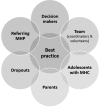Community-based rehabilitation programme for adolescents with mental health conditions in Israel: a qualitative study protocol
- PMID: 31857314
- PMCID: PMC6937008
- DOI: 10.1136/bmjopen-2019-032809
Community-based rehabilitation programme for adolescents with mental health conditions in Israel: a qualitative study protocol
Abstract
Introduction: In Israel, 12% of adolescents have mental health conditions. Approximately 600 adolescents with mental health conditions are hospitalised each year and about 40% of them return to the hospital and are thus cut-off from their daily lives and peers in the community. In contrast to adults, adolescents with mental health conditions in Israel are not eligible by law for rehabilitation services. Thus, the overarching goal of this qualitative study is to identify best practices for the implementation of community-based psychosocial rehabilitation programme for this population, by examining the first such programme in Israel. Amitim for Youth, which was established in 2018 by the Israel Association of Community Centers in cooperation with the Ministry of Health, the Ministry of Education and the Special Projects Fund of the National Insurance Institute.
Methods and analysis: Qualitative data will be collected through in depth semi-structured interviews and focus groups. To identify themes and patterns in the data, a six-stage reflexive thematic analysis approach will be used. A triangulation procedure will be conducted to strengthen the validity of the findings collected by different methods and from various stakeholders in the programme: the programme's decision-makers, programme team members, the intended beneficiaries and referring mental health professionals. To insure the trustworthiness of the findings, three strategies will be employed: memo writing, reflexive journaling and member checking.
Ethics and dissemination: This study was approved by the Ethics Committee for Human Research in the Faculty of Social Welfare and Health Sciences at the University of Haifa (#455-18) and by the Chief Scientist in the Ministry of Education (#10566). All participants will sign an informed consent form and will be guaranteed confidentiality and anonymity. Data collection will be conducted in the next 2 years (2019 to 2020). After data analysis, the findings will be disseminated via publications.
Keywords: adolescents; community; mental health; mental illness; psychiatric rehabilitation; recovery; youth.
© Author(s) (or their employer(s)) 2019. Re-use permitted under CC BY-NC. No commercial re-use. See rights and permissions. Published by BMJ.
Conflict of interest statement
Competing interests: None declared.
Figures
Similar articles
-
Process and outcomes evaluation of a pre-academic arts program for individuals with mental health conditions: a mixed methods study protocol.BMJ Open. 2019 Jul 18;9(7):e025604. doi: 10.1136/bmjopen-2018-025604. BMJ Open. 2019. PMID: 31324678 Free PMC article.
-
Community-based adolescent health services in Israel: from theory to practice.Int J Adolesc Med Health. 2002 Apr-Jun;14(2):139-44. doi: 10.1515/ijamh.2002.14.2.139. Int J Adolesc Med Health. 2002. PMID: 12467185
-
Creating an empirically-based model of social arts as a public health resource: Training, typology, and impact.Front Public Health. 2022 Oct 12;10:985884. doi: 10.3389/fpubh.2022.985884. eCollection 2022. Front Public Health. 2022. PMID: 36311644 Free PMC article. Review.
-
Addressing mental illness stigma in German higher education: study protocol for a mixed-methods evaluation of a psychosocial setting-based intervention.BMJ Open. 2024 Aug 28;14(8):e084916. doi: 10.1136/bmjopen-2024-084916. BMJ Open. 2024. PMID: 39209502 Free PMC article.
-
[COMMUNITY-BASED REHABILITATION: IMPORTANCE, PRINCIPLES AND ADVANCEMENT IN ISRAEL].Harefuah. 2024 Sep;163(9):589-593. Harefuah. 2024. PMID: 39285599 Review. Hebrew.
Cited by
-
The relationship between self-stigma and quality of life in long-term hospitalized patients with schizophrenia: a cross-sectional study.Front Psychiatry. 2024 Jun 5;15:1366030. doi: 10.3389/fpsyt.2024.1366030. eCollection 2024. Front Psychiatry. 2024. PMID: 38903644 Free PMC article.
-
Art Therapy Open Studio and Teen Identity Development: Helping Adolescents Recover from Mental Health Conditions.Children (Basel). 2022 Jul 11;9(7):1029. doi: 10.3390/children9071029. Children (Basel). 2022. PMID: 35884014 Free PMC article.
-
Describing community-based rehabilitation services in Indonesia by using The International Classification of Service Organization in Rehabilitation 2.0.J Rehabil Med. 2021 Mar 22;53(3):jrm00166. doi: 10.2340/16501977-2804. J Rehabil Med. 2021. PMID: 33624830 Free PMC article.
-
The Therapeutic Aspects of Embroidery in Art Therapy from the Perspective of Adolescent Girls in a Post-Hospitalization Boarding School.Children (Basel). 2023 Jun 20;10(6):1084. doi: 10.3390/children10061084. Children (Basel). 2023. PMID: 37371315 Free PMC article.
References
-
- Orkibi H, Ronen T. A Dual-Pathway model linking self-control skills to aggression in adolescents: happiness and time perspective as mediators. J Happiness Stud 2019;20:729–42. 10.1007/s10902-018-9967-1 - DOI
-
- Steinberg LD. Adolescence. 11th edn New York, NY: McGraw-Hil, 2017.
-
- Erikson EH. Identity: youth and crisis. New York, NY: W. W. Norton, 1968.
-
- Dwivedi K, Harper P. Promoting emotional well-being of children and adolescents and preventing their mental ill health a handbook. London, UK: Jessica Kingsley, 2004.
-
- Corrigan PW, Watson AC. The paradox of self‐stigma and mental illness. Clin Psychol Sci Pract 2002;9:35–53.
Publication types
MeSH terms
LinkOut - more resources
Full Text Sources
Medical

